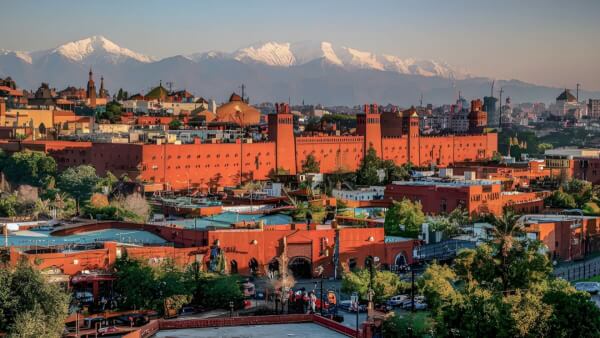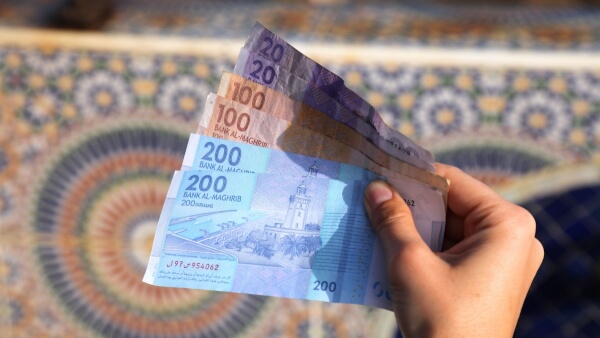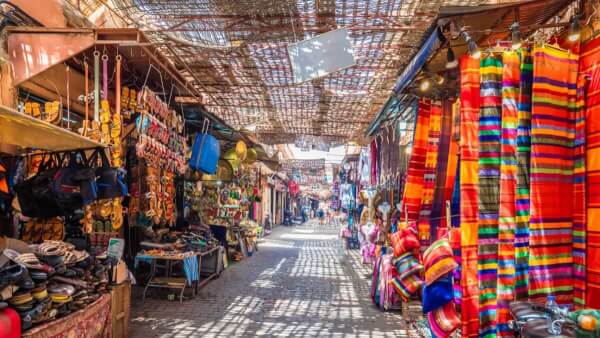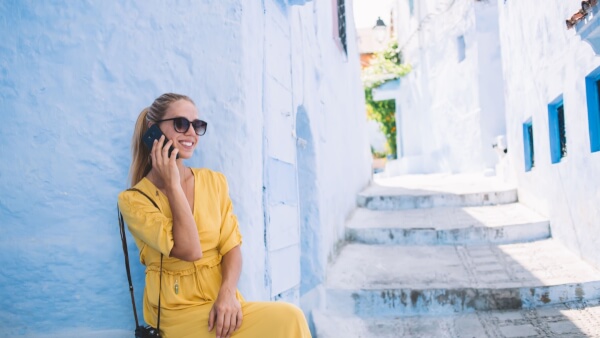Morocco tourist tax: What you need to know in 2025
Travelling to Morocco soon? Find out everything about the tourist tax in Morocco and essential travel tips.

Morocco’s tourist industry accounts for a significant slice of its GDP. Cruise ships sail in to the major ports, day trippers pop over from Southern Europe, and adventurous global travellers arrive all year long. There’s been significant government investment in developing the tourism infrastructure and with a wealth of culture, history and natural scenery, Morocco is a dream trip for many.
If you’re up for exploring this exotic country, you’re going to need some money to do it.
This guide explains all you need to know about Morocco’s currency and banking system, so you can get - and spend - the cash you need.
The official currency of Morocco is the Dirham. The Dirham is a closed currency, meaning that technically you can’t buy or sell it outside of Morocco. However, you’ll find it on sale in some exchange bureaus.
You’ll often find prices quoted in Euros instead of Dirhams, and may be able to use foreign currency to pay for goods and services when you’re there. Naturally, this is up to the individual shop or restaurant, so double check before committing to purchase.
It should also be noted that Australian or New Zealand Dollars aren’t usually accepted, so sticking with euros, U.S. dollars or British sterling is probably the best plan. If you can’t pay directly with these currencies, then you should be able to make a simple exchange to Dirhams when you need to.
| Dirham Symbols & Names | MAD, .د.م |
|---|---|
| 1 MAD | Each Dirham is divided into one hundred santimat. |
| MAD coins | Coins are issued in denominations of 1, 5, 10 and 20 santimat, and 0.5, 1, 2, 5 and 10 Dirhams. |
| MAD banknotes | For larger denominations there are banknotes in circulation - look out for 20, 50, 100 and 200 dirham notes. |
Moroccan banknotes are printed so that each denomination has a different distinctive colour, with images of Moroccan landmarks and natural scenery. You might come across slight variations within the notes as there are different series’ in circulation at the same time.
As mentioned previously, because it’s a closed currency you’ll most likely need to exchange cash upon arrival in Morocco. Importing (or exporting) up to 1000 MAD is accepted by authorities if you do happen to find a local exchange bureau who’s found a way around the rules.
If you exchange your currency in Morocco, keep the receipts so that you can exchange any leftover Dirhams back at the end of your trip. Or even better - spend everything while you're there so you can avoid being hit twice for fees.
One good reason to exchange some cash for dirhams is that traders tend to shamelessly round up their prices to customers purchasing in euros. If you change some money, you can have more control over the rates you accept.
You can change currency easily in the major cities and tourist areas of Morocco. The airports have several exchange desks - so it’s worth shopping around. If you aren’t happy with the exchange rates offered, then simply change what you need immediately and look for a better deal in town.
Know the mid-market exchange rate and use it to find out if you’re getting a fair deal
The best way to tell if a deal is actually fair is to understand the mid market rate. The mid-market is the real exchange rate, and the difference between this and the tourist rate is the profit margin built in for the exchange bureau.
Find out the live mid-market rate for your currency by using a currency converter online, so you can use it to compare the rates you’re offered. Don’t forget also to watch out for hidden fees. Before you hand over your cash, make sure you know what number of Dirhams you’re getting in return.
Finally, if you're taking hard cash to exchange upon arrival, make sure that you have clean, crisp, common notes. Don’t take regional banknotes from the UK, for example, as Scottish or Northern Irish notes won’t be recognised. Similarly, if your bills are in anything less than perfect condition, then the exchange service may be reluctant to take them.
Many travellers choose to avoid the hassle by withdrawing cash from an ATM when they arrive (but more on that later).
Traveller’s Cheques aren’t widely accepted in Morocco. You’ll struggle to find a bank that will change them for you, and the fees they apply can be quite steep. If you have them and need to make an exchange regardless of cost, a large hotel might be able to help you out.
It’s probably best to choose alternative methods of payment for this trip, like a mix of ATM withdrawals and debit card payments.
Credit and debit cards aren’t widely used outside of the cities and tourist resorts in Morocco. However, in high-end establishments you shouldn’t have a problem paying with your card, though American Express isn’t commonly accepted. Anywhere else, it’s advisable to carry cash in case you come across a retailer that cannot take card payments.
If you get stuck, use one of the ATM locators in the next section to find a nearby bank machine to withdraw some cash.
Where you can use them, cards are a convenient way of paying for goods and services while you're travelling. However, watch out for something called Dynamic Currency Conversion (DCC), which is a common - but hidden - pitfall.
DCC is a ‘service’ that allows you to see how much a transaction will cost in your home currency when you’re paying your bill. While that sounds good, the exchange rate applied by the local merchant is often poor. You pay for the convenience, and the local bank operating the card terminal will gladly take your money off your hands. The best rate you’ll get paying with your card is always from your home bank - which means always choosing to be charged in the local currency, MAD.
If you do decide to use your card when you’re abroad, make sure your bank know you’re planning a trip. If not, they may see a spike in unusual activity outside your home country and block all your cards until they have contacted you.
ATMs are common in Moroccan cities and accept the major card providers. However, at busy periods, cash machines may be out of service until they are restocked, so don’t wait until you’re desperate for currency.
Visa ATM locator
MasterCard ATM locator
Amex ATM locator
Using an ATM is a good choice for many people because it is convenient and usually comes with a reasonable exchange rate. However, the one thing to watch out for is DCC (see the previous section). Though being charged in your home currency may sound nice, it’s best not to opt for this ‘service’. Always select to be charged in local currency when withdrawing money.
ATMs will charge for their services as a standard, so enquire at your home bank what their fee for an overseas withdrawal will be. There might then be a second charge levied by the ATM provider - but even with these fees, ATM withdrawals are often the best deal because of the better exchange rate used.
Morocco has good banking networks with the largest institutions listed below. These banks cover the country and beyond, with branches and coverage throughout Europe and North America.
If you’re travelling to Morocco, it’s a good idea to ask your home bank if they work in partnership with any of the banks operating in Morocco. If they do, then you might be able to access some services - ATM withdrawals, for example - at a reduced fee.
Another great option, for simple access to your money abroad - and an even better deal - is to use use Wise.
If you have a bank account in Morocco, or know someone who does, you can transfer money between accounts using the real mid-market exchange rate. It's a convenient way to get the Dirhams you need for your trip, with no hidden fees.
*Please see terms of use and product availability for your region or visit Wise fees and pricing for the most up to date pricing and fee information.
This publication is provided for general information purposes and does not constitute legal, tax or other professional advice from Wise Payments Limited or its subsidiaries and its affiliates, and it is not intended as a substitute for obtaining advice from a financial advisor or any other professional.
We make no representations, warranties or guarantees, whether expressed or implied, that the content in the publication is accurate, complete or up to date.

Travelling to Morocco soon? Find out everything about the tourist tax in Morocco and essential travel tips.

How much money can you take to Morocco? Read this handy guide for info on the rules for taking cash in and out of Morocco.

Should you pay with cash or card in Morocco? A handy guide including cash etiquette, Moroccan ATMs and using your UK card.

What is the best currency to take to Morocco? Read our guide on currency in Morocco, accepted payment methods and more.

Can I use Revolut in Morocco? A handy guide covering using your Revolut card and account in Morocco, spending in MAD and more.

Check out our in-depth guide on everything you need to know about buying a prepaid Morocco SIM card, including different providers, pricing, and features.